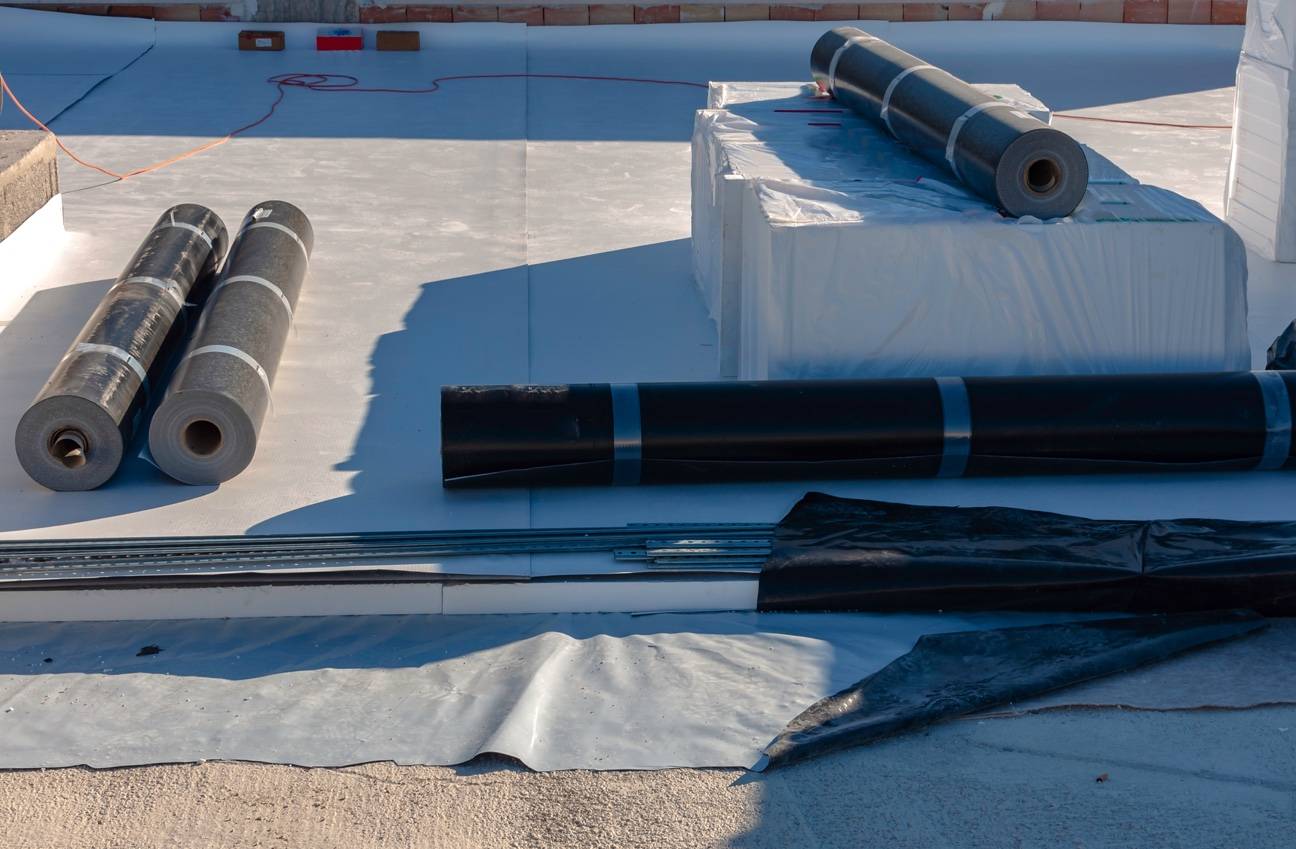Mon - Fri 7:00 am - 4:30 pm
601 South Palm Ave, Alhambra, CA 91803
Posted by thomas ferriere No Comments on The Pros and Cons of Single Ply Roofing Roofing
The Pros and Cons of Single Ply Roofing
For business owners in California, fall is one of the prime times to take care of roofing repairs and replacements. If you’re evaluating roofing options for your commercial building, you’re likely considering single-ply roofing.
Like all roofing materials, there are pros and cons associated with using a single-ply product.
In this article, we’ve covered what you need to know to make your decision. Take a minute and learn more about this robust commercial roofing material.
What Is Single-Ply Roofing?
Before drilling down to the details of the pros and cons, here are the key features that set single-ply roofing apart from other roofing materials.
First, single-ply roofing isn’t a brand-new technology.
Roofing contractors began using this type of roofing material in the 1960s. At that time, they used synthetic rubber composed of ethylene and propylene. Ethylene propylene diene terpolymer (EPDM) is a thermoset.
Commercial roofing contractors use EPDM, polymerized vinyl chloride (PVC), or Thermoplastic polyolefin (TPO) in single-ply roofing installations. PVC and TPO are thermoplastics.
Regardless of the specific material used, all single-ply roofs are constructed of flexible sheets of thermoset or thermoplastic membranes. They work best on commercial structures with low-sloped or flat roofs.
Over the following few sections, we’ll cover some key advantages of installing a single-ply roof system.
Proven Track Record
Single-ply membrane roofs have a long history of success. Six decades!
If a roofing material hasn’t proven its worth after 60 years, it wouldn’t be one of the most utilized commercial roofing options.
This is a well-respected roofing system solution. Many businesses choose single-ply roofing systems to protect their buildings.
Lightweight and Flexible
When evaluating different types of roofing for commercial buildings, weight plays a significant role. You want a lightweight and flexible material.
Single-ply roofing is lightweight. This reduces the amount of stress on the roofing system.
The membrane’s flexibility permits the installation team to follow unique building designs.
High-Performance Roofing Option
Your new roof needs to hold up under every type of weather or natural disaster. Rain, hail, and wind can cause significant damage to a commercial roof.
Leaks and wind cause more damage than any other weather factor.
A single-ply roof membrane is waterproof. It’s also resistant to damage from UV rays, another cause of premature wear and tear on a commercial roof.
A Long-Lasting Commercial Roofing Solution
As you may already know, the longevity of a commercial roof depends mainly on the weather, maintenance, and roofing materials. If your roofing contractor uses the highest quality single-ply membrane, the result is a roof that lasts between 25 and 40 years.
Because single-ply roofing materials are designed with the weather in mind, you won’t need to worry about the weather.
Maintenance is another story. You can maximize the lifespan of a commercial roof by scheduling routine roof maintenance. Most commercial roofing companies recommend a roof inspection at least twice a year.
Your in-house maintenance team can inspect the roof in between professional inspections.
Single-Ply Roof Systems Are Safe
When you choose a single-ply roof system, you’re not only protecting your building from outdoor elements like weather and direct sunlight. The safest roofing materials have a Class-A fire rating.
The Class-A fire rating of single-ply roof membranes makes them an excellent choice for commercial roofs. Choosing this roofing system protects your investment and those who work in and visit your business.
Enjoy the Advantage of Easy Installation
If you compare a single-ply roof replacement with a new asphaltic rolled roof system, the single-ply membrane will win in the category of easy installation. Installation is made easy due to the following features:
- No torches or hot asphalt required
- Fewer seams
- Pre-fabricated detailing accessories
These types of roofing projects typically don’t take as long. That means the everyday activities at your business location won’t be impacted for as long as they would with a rolled roof replacement.
Ease of installation often leads to financial savings for the business owner over using other types of roofing solutions.
Next, we’ll explore some cons of using single-ply roofing materials.
A Few Disadvantages of Single-Ply Roofing Materials
Even the highest-quality building materials aren’t perfect. That includes materials used for commercial roofing. Here are a few of the disadvantages of single-ply roof systems:
Punctures
Single-ply membrane roofs can puncture, but so can other roofing materials.
Punctures often happen when someone drops a sharp object on the membrane during installation. Gravel on the bottom of shoes can also cause punctures. If the roof gets a lot of heavy foot traffic, there’s also a risk of punctures.
The good news is that if the membrane punctures, the repair is relatively easy.
Seam Failure
Seam failure happens because of stress on the membrane seams.
Over time, single-ply membranes can become brittle. The membrane can also shrink and lose elasticity. All of these things can lead to seam failure.
Seam failure can also happen due to improper installation. The best defense against seam failure is to hire a commercial roofing contractor with a proven history of working with single-ply roof materials.
Water Retention
While standing water isn’t an issue specific to single-ply roof systems, it can happen and is one of the most common disadvantages of using single-ply roofing materials.
There are several actions you can take to mitigate the problem of water retention, including:
- Clean and clear drains
- Add new drain lines
- Repair low spots
- Install roof crickets
All of the cons of single-ply roofs involve steps you and your commercial roofing contractor can take to prevent or significantly reduce problems associated with using this type of roofing system.
Schedule Your Commercial Roof Replacement Today
When choosing a roofing material for your commercial building, you can’t go wrong with single-ply roofing. Next, you’ll take the critical step of choosing your roofing contractor.
This isn’t the time to try out the new kid on the block. It would be best if you had a roofing contractor with experience in your roofing material of choice.
In business since 2017, HP Commercial Roofing Pro specializes in installing and repairing commercial roofs. Contact us today and schedule a free roof inspection.
Recent Posts
Categories
Recent Posts
Do you have any questions?
Contact us at The HP Roofing PRO office or submit a business inquiry online
Contact Us






